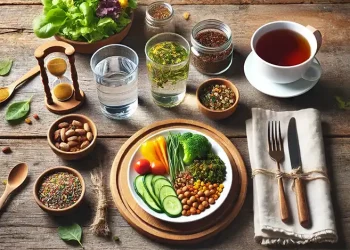We all want what’s best for our health. When it comes to food, “best” often translates to “organic.” But are the rumored organic food benefits real or just clever marketing? Let’s explore the potential upsides—and downsides—of buying organic.
What Does “Organic” Really Mean?
First things first: “organic” isn’t synonymous with “natural.” “Natural” on labels simply means the product has no artificial additives. “Organic,” however, goes much deeper. In the United States, the USDA has strict guidelines that farmers and producers must meet to label their products “organic.” This certification focuses on sustainable farming practices. They also prohibit genetically modified organisms (GMOs), synthetic pesticides, and certain fertilizers.
Unpacking the Benefits of Organic Food
Numerous studies suggest that choosing organic fruit and vegetables offers a range of potential benefits over conventionally grown counterparts. Some organic products include meat, dairy products, and even organic oats.
Fewer Pesticides
Organic farming significantly limits pesticide use. Why does this matter? Pesticide residues have been linked to various health concerns. It’s always a smart move to minimize your exposure to these chemicals whenever possible.
More Nutrients
Several studies indicate that organic produce, in particular organic fruits, boasts higher levels of specific vitamins, minerals, and antioxidants, including fatty acids. This difference can be attributed to healthier soil and the absence of chemical interference. And who doesn’t want more nutritional bang for their buck?
Environmental Protection
Choosing organic often aligns with a more sustainable lifestyle. Organic food production tends to be easier on the environment. This includes promoting biodiversity, enriching soil health, and conserving water resources. While this benefit might not directly impact your health, it contributes to a healthier planet for all.
The Price Tag: A Common Concern
It’s no secret: organic food often comes with a heftier price tag than its conventionally-grown counterpart.
So, are the health benefits of organic food worth the extra cost?
This is a personal decision. But consider this: you’re investing in your well-being and supporting sustainable practices. If your budget allows, incorporating more organic choices into your diet can be a step towards a healthier lifestyle.
Simple Ways to Make Organic More Affordable
- Prioritize: Opt for organic versions of foods known to have higher pesticide residues, such as berries and leafy greens.
- Buy in Season: Seasonal produce is not only fresher but often more affordable.
- Explore Farmers Markets: Connect directly with local farmers and often get better deals on organic goods.
Navigating the Organic Label Maze
Walking down the grocery aisle, it’s easy to feel overwhelmed by various labels like “100% Organic,” “Organic,” or “Made With Organic Ingredients.” Knowing the differences can be crucial for making informed decisions about the products you buy.
To determine what qualifies as a certified organic product, you can review the ingredients label to see if it meets the USDA organic standards. To make things easier when shopping, look for the USDA seal, which signifies that the product is USDA certified. Foods labeled as organic must meet strict government standards and regulations. Products labeled “100% Organic” must only include organic ingredients on the ingredient list. The National Organic Program has a list of approved additional ingredients.
Debunking the Myths
One common misconception is that organic food is always safer from bacterial contamination. This isn’t true. Organic farming utilizes natural pesticides and green manure to improve soil quality. While this is great for improving soil, organic food, like any food, requires proper handling, storage, and cooking.
Organic farms help to reduce soil erosion. These farms also help combat climate change and preserve biodiversity. The key is to practice food safety measures no matter what you’re eating. Always wash your produce thoroughly under running water before consuming it, organic or not.
Navigating the world of nutrition can be challenging. It’s important to make informed choices about the food you consume. Organic food benefits, from potentially higher nutrient content and reduced pesticide exposure to supporting sustainable farming practices, deserve our attention. However, the price tag is a reality, making it a personal decision with various factors at play.
As with any health decision, gathering accurate information is key. Consider integrating organic options gradually into your lifestyle—and your taste buds—and enjoy the potential benefits.
Also Read This : Organic Pet Food Benefits – Why Your Family Dog Deserves the Best
Disclaimer:
This article provides general information on the benefits of organic food for educational purposes only. It is not a substitute for professional nutritional or health advice. Always consult with a qualified healthcare provider or nutritionist before making significant changes to your diet. Well Health Organic does not take responsibility for the accuracy, completeness, or outcomes of the information provided. The content is intended to guide and inform about organic food choices and is not a guarantee of specific health benefits.















